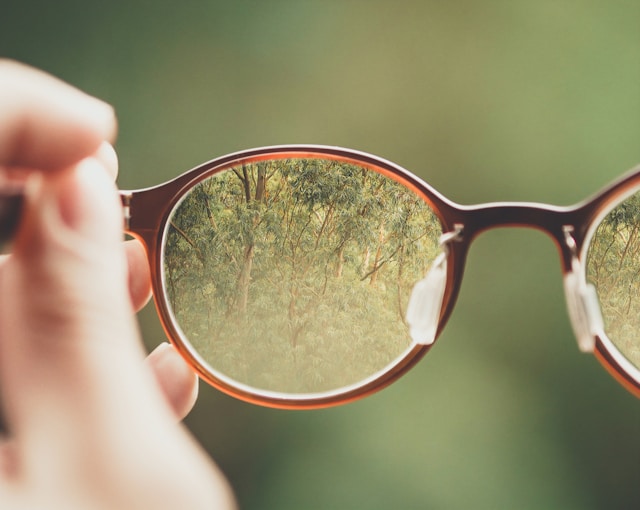5 Simple Ways to Take Care of Your Glasses for Long-Lasting Clarity

Glasses are important for seeing well and being comfortable every day. You need to take care of them to work as well and last longer. Otherwise, they'll scratch or get damaged and you can't see clearly into the lenses. This article gives you five ways to keep your glasses clean for longevity and the best performance as well.
Clean Your Glasses Properly
This includes proper cleaning to ensure that the glasses remain long-lasting and clear. The sight is reduced and scratches are likely to occur if lenses are dirty. In addition, the wrong techniques of cleaning might cause damage. Therefore, the maintenance of glasses requires following a specific cleaning routine.
- Step-by-step cleaning process: Rinse all lenses in warm water to check for tiny fragments or specks that would otherwise scratch out parts of them. Avoid water with extremely hot temperatures. Wet both sides with tiny amounts of diluted mild soap solution. This step is against abrasive chemicals or chemicals. Squeaky-clean it by carefully taping excess droplets on either side from your clean, white microfiber. Pat them instead of trying to massage them to prevent scratches. Clean the lenses using a fresh microfiber cloth and do not let dirt and oil touch the lenses.
- Why avoid certain cleaners: Certain cleaning agents damage the special lens coatings on glasses that block blue light or minimize glare. Using cleaning agents can remove smudges agents that can be damaging to coatings over time. It is safe to use a cleaning solution designed exclusively for glasses made of safe material and coatings.
- Storage Tips for Success: Just like washing, storage is as important for your glasses. Never take off your glasses without placing them in a case to prevent getting them dirty with dust and other particles. Besides, it keeps scratches away, especially from the countertop or table surfaces. Ensure that it is tough enough to keep your glasses safe when they fall. When not being worn, you should store your glasses in a case to not shatter or become cloudy.
Keep Your Glasses Safe from Scratches
Scratches on glasses make lenses weaker and blur vision which makes them more likely to break. Multiple reasons can cause scratches, which include having been so roughly handled or exposed to dirt. You should make sure to take care to avoid scratching your lenses.
- Use a protective case: The best way to prevent scratch damage when not in use is only true if a hard case is available. Endure pressure and drop. The case should be made of a soft material like fabric if it is not a hard case. Otherwise, risk having your glasses get damaged through an unprotected fall from your pocket or bag.
- Avoid placing glasses face down: Refrain from doing that. They are prone to scratches that way. Dust and dirt on levels, countertops, and tables can damage the lenses. Prevent this by laying your glasses down with the lenses facing up. Though it can't seem like much, making it a habit will help avoid scratches on your lenses.
- Be mindful of the environment: Take good care of the surroundings and your glasses. Extreme heat can damage the lenses and bend the frames. Mold can grow on your glasses and cause harm if you keep them on a damp surface. Avoid placing your glasses in direct sunlight for extended periods and always store them in a cool, dry location.
Avoiding Exposure to Harmful Substances
Your glasses can be damaged by certain things. Over time, the lenses and frames can suffer damage from cleaning agents and airborne pollutants. Therefore, it is essential to understand how to protect from these harmful substances.
- Protect against chemical exposure: Common substances could harm your eyewear. Oils and chemicals included in hairspray, lotion, perfume, and cleaning products can form a thin, undetectable film on your lenses. This layer can block your vision and interfere with any anti-glare or scratch-resistant coatings that can be applied to your glasses. Before applying these items, make sure to remove your glasses to prevent any contact.
- How to care for sunglasses: Like ordinary glasses, sunglasses require proper care to prevent damage. Over time, sunlight can cause the lens coating to break down, limiting your vision. Always clean your sunglasses with the proper cleansers. Sunglasses can get damaged by sand and seawater, so do not leave them in hot or humid areas, especially at the beach.
- Keep your glasses away from saltwater: Saltwater can harm your glasses if you are swimming in the ocean or doing water sports. It can leave scratches on the lenses and rust the metal parts of the frames. As soon as your glasses come into touching the seawater, immediately clean them with fresh water and pat dry with a soft towel. Use a water-safe detergent or put your glasses in a case when you go to the beach or the pool.
Adjusting Your Glasses to Maintain Comfort and Fit
Wearing glasses that don’t fit well can be uncomfortable. If they don't fit right, they can get bent or even break over time. If your glasses are tight or keep slipping, ensure they fit well for comfort and stability. This will help them last longer and make you more comfortable.
- When to get your glasses adjusted: If your glasses don't fit well anymore, it's time to get them fixed. It's normal for glasses to become loose or tight over time, especially if you wear them often. If your glasses keep sliding down your nose or pressing against your head, they can cause discomfort or headaches. If this happens, take them to an eye doctor for help. They can adjust the parts of your glasses to make them fit better.
- Self-adjustment tips: It's best to have a professional fix your glasses, but you can try a few small adjustments at home. For example, you can gently bend the sides of your glasses to make them fit better. Just use a little pressure, as too much can break them. If you need to change the nose pads, do it carefully because they can be fragile. Make sure to check how they fit after each adjustment to ensure they're comfortable.
- Cleaning nose pads and hinges: Cleaning nose pads and hinges is important because they can get dirty and oily from everyday use. If you don’t clean them, it can make your glasses uncomfortable and harder to use. Regularly wipe these parts with a damp cloth or cotton swab to prevent skin irritation and maintain proper hinge function.
Regular Professional Checkups and Maintenance
Taking good care of your glasses, like cleaning them often, can help them last longer. But it's important to have a professional check them sometimes. They can inspect both lenses and frames for any issues you can miss to ensure they are in good condition.
- Annual checkups: It's wise to have an annual eye checkup, especially if you wear glasses daily. The eye doctor will examine your lenses for damage, tighten loose screws, and ensure your frame fits correctly. During this visit, you can also have your lenses cleaned and updated if needed.
- Lens replacement: If you see that your lenses are scratched or getting foggy often, it might be time to get new ones. Although glass frames can usually be fixed, damaged lenses might require complete replacement for clear vision. Most eye care professionals provide lens replacement services, so you don’t have to buy a brand-new pair of glasses. Replacing the lenses is usually cheaper than buying new glasses.
- Frame repairs: If your glasses have any damage, a professional can assess if they are repairable or if replacement is necessary. Many eye doctors offer repair services for small problems, which can save you money and help your glasses last longer.
Conclusion
By following these five easy steps, you can keep your glasses in great shape for a long time. Taking care of your glasses by keeping them clean and functional can save you money on frequent replacements. Your glasses are crucial for your eyesight and daily life, so caring for them is a small but significant effort.








